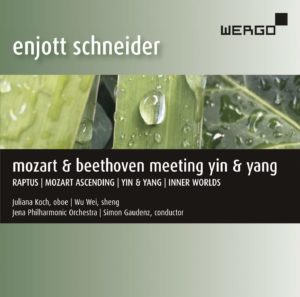There’s nothing wrong with modern composers leaning on past composers for their inspiration. Except when it is. Falling on the good side you have Zender’s Winterreise, Berio’s Rendering, or Udo Zimmermann’s Cello Concerto. Less successful, to put it generously, are Bernhard Lang’s removing any complexity from Parsifal but keeping the runtime with ParZeFool, Peter Gregson regurgitating Bach Suites, or Wolfgang Mitterer sampling Beethoven’s nine symphonies down to 60 ADD-inspired minutes. (See Classicstoday Insider archives for reviews of the Lang and Gregson.) The two opening pieces on Enjott Schneider’s latest disc on Wergo, I am afraid, fall into the latter, “less successful” category.
Raptus—The Freedom of Beethoven juxtaposes Beethoven-bits of different styles, contrasting the lyrical and rapturous with the rebellious, severe, and the wild. That sounds vaguely convincing on paper, but the result isn’t much different from the “knob-fiddling” of a Wolfgang Mitterer. Mozart Ascending for oboe and orchestra is more in the category of Berio’s Rendering, of taking the extant original parts of an unfinished composition—in this case, the short fragment that is Mozart’s Oboe Concerto K. 293—and putting them together with modern glue. But the blocks of extant material clash with Schneider’s darkly dramatic preludes, bridges, and filling material. He’s not trying to do what Mozart might have done, mind you, and his language is still decidedly modernish. But it’s not the abstract language Berio uses, it’s Schneider’s generally pleasant modern-consonant voice that, instead of delineating the borders of the original from the structural additions, completely takes over the concerto.
The film-music-like epilogue Mozart Ascending, in particular, is jarringly kitschy. Or to use an architectural analogy: the classical Greek temple ruins of Mozart’s concerto aren’t completed with a lean glass-and-steel structure but with Biedermeier brick-and-mortar. It’s at once too different and not different enough. It sits ill at ease in the middle of the possibilities; the balance is off. Now, if Juliana Koch’s oboe-playing was the last word in seductiveness, rather than just very satisfactory, you could make an argument to get this as the best way to experience the fascinating oboe concerto fragment. But as it stands, Ingo Goritzki’s performance of that movement as completed by Robert Levin (Claves) is your best bet.
The other two works come across as more successful: There’s Yin & Yang, a concerto for sheng (roughly an ancient Chinese version of the melodica) and orchestra. Despite the occasional outbreak of chinoiserie, it’s a genuine- and unique-sounding work that might very (very!) vaguely remind you of Villa-Lobos’ great harmonica concerto. Even total sheng-neophytes will appreciate Wu Wei’s mastery of the instrument. Inner Worlds, a “symphonic mood painting from the opera Trackman Thiel”, is the purest Enjott Schneider on the disc. It’s a very appreciable symphonic synthesis of his opera: dramatic, tonal, occasionally dark (Forest Solitudes), sometimes sweet and jolly (Nature’s Peace), imaginatively scored throughout, and very well played (very fine brass!) by the Jena Philharmonic Orchestra under Simon Gaudenz. That and the concerto might just about make it worth skimming over the first five tracks.
































